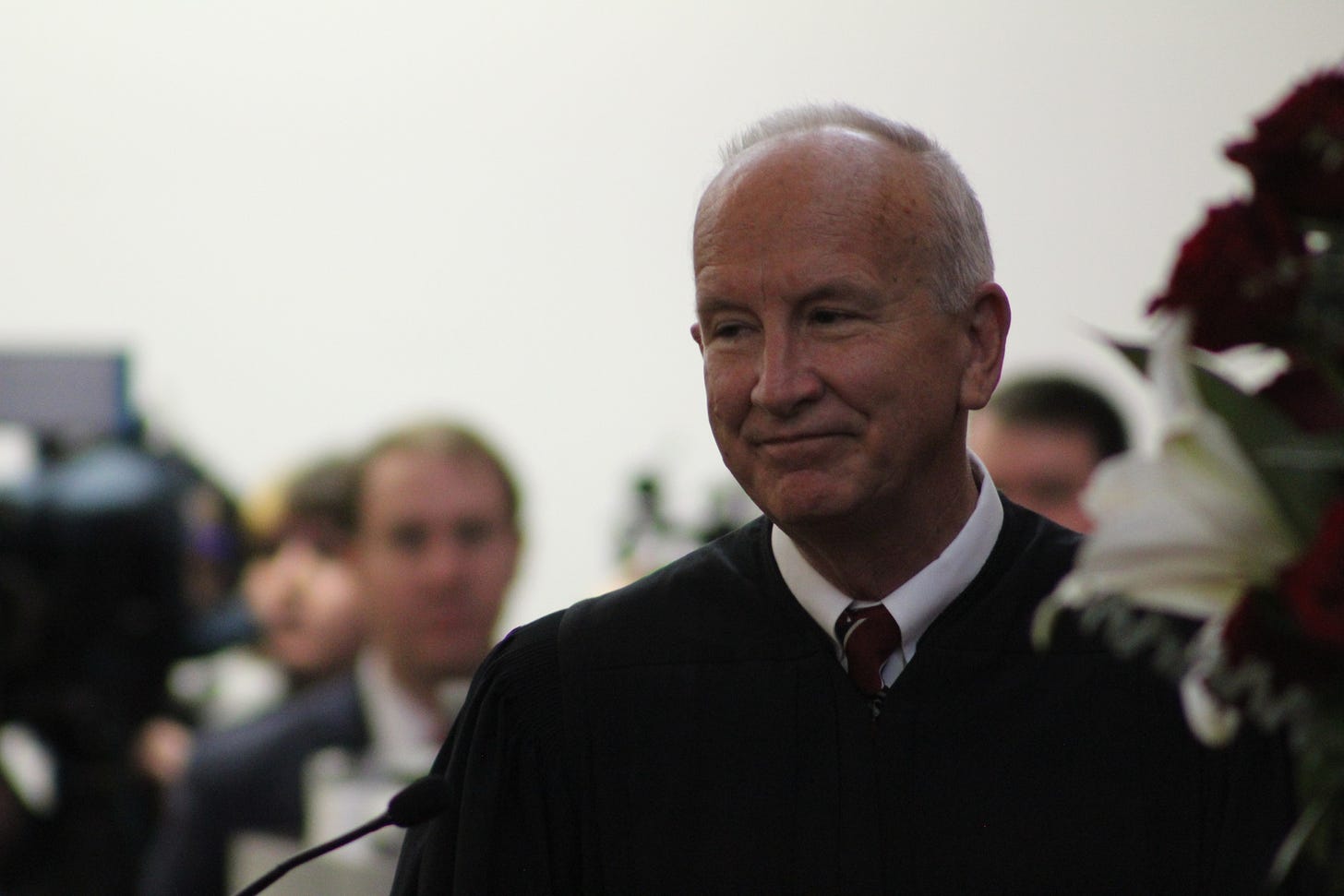Weekly Recap: Catch up on the news you missed from 4/23-4/29
NC's Supreme Court will let state lawmakers redraw partisan voting maps, require photo ID and prevent many felons from voting. Meanwhile, lawmakers advanced a bill expanding private school vouchers.
Lots of news to dive into from the past week. Let’s begin with what may have been the most consequential day of state court rulings in recent North Carolina history…
⚖️Supreme Court rules on partisan gerrymandering, voter ID and felon voting

The North Carolina Supreme Court issued three decisions on Friday split along ideological lines that deal a devastating blow to Democrats’ political influence in the state. Let’s take them one by one starting with what may have the largest and most immediate political impact: redistricting.
✏️Lawmakers free to draw new voting maps
Perhaps most consequential, the 5-2 conservative majority court ruled that the state’s Republican-controlled legislature could go back to the drawing to enact new state House, Senate and congressional maps to remain in place for the next decade.
“There is no judicially manageable standard by which to adjudicate partisan gerrymandering claims,” Chief Justice Paul Newby wrote in the majority opinion.
Democrats were quick to criticize the decision, with Gov. Roy Cooper saying the state high court “followed the marching orders of the Republican legislature by declaring open season for their extreme partisan gerrymandering.”
Republican lawmakers, meanwhile, praised what they saw as the court rightfully preserving their mapmaking authority.
“The decisions handed down today by the NC Supreme Court have ensured that our constitution and the will of the people of North Carolina are honored,” GOP House Speaker Tim Moore said in a statement.
With a 5-2 GOP-led state Supreme Court seen as highly unlikely to overturn gerrymandered voting maps and conservatives retaining control of the high court through at least 2028, voter advocacy groups now see little room for immediate hope.
When I asked during a virtual news conference on Friday what his group’s plan was going forward to prevent highly advantageous GOP maps from being implemented, Bob Phillips, executive director of Common Cause North Carolina, replied, “Well, it’s not seeking relief, unfortunately, with this court. It has proven that it is not going to be the place that upholds the protections in our constitution that we would assume and would’ve hoped that they would’ve held up and adhered to.”
He added, “What we can do is do what Common Cause is kind of designed to do, and that is to shine a bright light on what’s happening in the building [General Assembly].”



Republicans already have veto-proof control of the legislature, but could draw even more politically favorable maps to be used in the 2024, 2026, 2028 and 2030 elections. The U.S. House is presently evenly split 7-7, but that will almost assuredly change dramatically starting in 2024.
Michael Bitzer, a Catawba College political scientist, sees four Democratic incumbents as particularly vulnerable: Wiley Nickel of Raleigh, Jeff Jackson of Charlotte, Kathy Manning of Greensboro and Don Davis of eastern North Carolina. Nickel and Jackson are most clearly susceptible to being drawn out of their current seats, followed by Manning. Davis is likely to remain in a district that is at least somewhat competitive.
Barring surprises or unexpected successful legal challenges at the federal level, the congressional map Republicans implement would also be in place for the next four election cycles.
🪪Photo ID requirement
The North Carolina Supreme Court also ruled that a 2018 law requiring voters to present a photo ID at the polls could be implemented.
But implementation is a lot more complicated, as there are also two separate cases dealing with this law, including one in federal court that could prevent the photo ID law from being carried out before the 2024 election.
Democrats argue the law would disproportionately impact poorer residents and people of color who may not have a photo ID. Republicans say the law was not crafted with such intent and that voters already made their views clear on the policy when they voted in 2018 in support of a constitutional amendment to require photo identification to vote. In a state that is nearly evenly divided politically, the constitutional amendment was supported by an 11-point margin.
🗳️Voting rights for felons⛓️
On Friday, the conservative majority court reversed a trial court’s decision on voting rights for residents convicted of felonies.
A trial court allowed for the restoration of voting rights for an estimated 56,000 North Carolinians who were no longer in prison for felony convictions but either had unpaid fines or were still serving probation or parole.
Under the state Supreme Court ruling on Friday, convicted felons no longer in prison who wish to have their voting rights restored must finish their probation or parole and pay off any outstanding fines.
While the tens of thousands of affected residents pale in comparison to the state’s existing 7.2 million residents, their inability to vote could sway the outcome of hotly contested races in the state. In 2020, Newby, the state Supreme Court’s current chief justice, won by just 401 votes out of nearly 5.4 million ballots cast in the race.
☠️Expelling members
Earlier this month, Tennessee voted to expel two Black Democratic lawmakers after they protested in the well of the House in support of increased gun restrictions.
In Montana on Wednesday, a transgender lawmaker was blocked from appearing on the House floor for the remainder of the session after criticizing colleagues that had pushed for a ban on gender-affirming care for minors.
The actions got me thinking: Could such a thing happen in North Carolina? The short answer: yes, but it would be pretty unprecedented.
While North Carolina doesn’t have recall elections, lawmakers are able to vote to remove their colleagues.
A North Carolina state lawmaker hasn’t been expelled by their colleagues since 2008, when Democratic Rep. Thomas Wright of New Hanover County was accused of violating campaign finance laws. Wright was later sentenced to serve 70 to 95 months in prison after a jury convicted him of three counts of fraud.
The prior expulsion: 1880, when Josiah Turner, Jr., a Ku Klux Klan sympathizer and Confederate congressman who went on to represent Orange County in the legislature, was expelled for disorderly conduct and ad hominem attacks against his legislative colleagues.
Nationwide, forced removals are very rare in recent history. Across all 50 states since 2000, there have only been 19 instances of legislators being expelled, according to a Politifact review.
My conclusion: It’s difficult to rule anything out in the messy, hyperpartisan and divisive world of North Carolina politics, but an expulsion would be pretty unprecedented. Republicans have appeared to increasingly advance divisive bills with minimal Democratic input. GOP leaders in both chambers have refused to allow amendment consideration for contentious bills this year. And most recently, the House has limited members’ ability to ask questions in committees in an effort to advance a flurry of bills before the May 4 crossover deadline and before the legislature heads into summer recess in late June or early July.
🏫GOP advances school choice measure giving K-12 kids an at least partially subsidized private schooling option
Senate Bill 406 on Wednesday cleared its first committee vote. The Senate proposal and its identical House counterpart are supported by every Republican lawmaker, giving it veto-proof support and making it likely to become law over Democratic Gov. Roy Cooper’s objection. If enacted, North Carolina would see a dramatic expansion of its voucher program, also referred to as “opportunity scholarships.”
Democrats and education associations worry the plan would diminish the quality of public education by redistributing state funds away from public school systems and directing them instead to religious, charter and other nonpublic schools. They also criticize the proposal for offering scholarships to wealthy families that don’t need it.
Kids in households that qualify for the federal free or reduced-price lunch program (made $55,500 or less for a family of four) would get a scholarship amount up to 100%, of North Carolina’s average per pupil spending for average daily membership, or about $7,400. Currently, public school students who qualify for free or reduced lunch can get an opportunity scholarship amounting to as much as 90% of the state’s per pupil spending or $6,492. SB406 increases the scholarship amount for low-income families and expands scholarship eligibility to nearly all K-12 students, regardless of income.
For a family of four, the bill would give kids in households that made $55,501-$111,000 a 90% scholarship. Households that earned $111,001-$249,750 would get a 60% scholarship. Students in households that made $249,751 or more would qualify for a scholarship up to 45% of the state’s per pupil spending.
Bill stripping Cooper of community college appointment power stalls in Senate
The North Carolina Senate on Tuesday decided not to take up a bill that would dramatically change the governance structure of the state’s community college system and strip the governor’s appointment authority.
Senate Bill 692 was re-referred to the chamber’s Education Committee, which had been scheduled to take up the measure at 11 a.m. Wednesday, but removed the bill from its agenda at the last minute.
Other news
On Tuesday, I wrote about a proposal from a bipartisan group of House lawmakers that would bring more transparency to the chamber. Under House Bill 859, or the “NC House Transparency Act of 2023,” all committee meetings and floor votes would have audio and video available both live and in an archived format.
On Monday, I highlighted that Jeff Cox was formally introduced as new president of NC Community College System.
👀What to watch this week
MONDAY-THURSDAY: You can expect to see a flurry of bill movement ahead of the Thursday, May 4 crossover deadline. This is the deadline that most bills must meet in order to be considered this legislative session. There is, however, a common workaround to this deadline, as committees can gut and amend bills down the line.
This week will also mark the start of Round 2 of the Stanley Cup Playoffs for the Carolina Hurricanes!
📖5 essential reads
North Carolina mulls a workplace ban on critical race theory (Hannah Schoenbaum // Associated Press)
NC House leaders back bill allowing healthcare workers to turn away patients for 'moral' reasons (Laura Leslie // WRAL)
NC House votes to allow more backyard cottages (Colin Campbell // WUNC)
Mike Pence visits UNC, denounces the ‘woke left’ and hints at presidential plans (Kyle Ingram // Raleigh News & Observer)
Catawba College becomes first campus in North Carolina — and the Southeast — to go carbon neutral (Elizabeth Ouzts // Southeast Energy News)
🙏Thank you for subscribing!
Welcome all new subscribers who have joined the Anderson Alerts family! On Sundays, I provide weekly recaps of key news of the week from North Carolina politics. If you want to receive all midweek alerts in real-time, you can upgrade your membership. All net proceeds from individual subscribers go to the charity.
With a chaotic week ahead in the legislature, I expect to return to your inbox soon.




